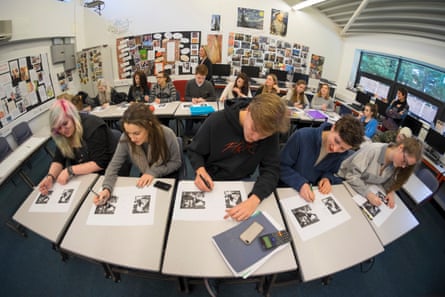The last exam board in England offering art history A-level will drop the subject from 2018, marking the latest in a cull of perceived “soft” subjects following the curriculum changes begun by the former education secretary Michael Gove.
The Association of Art Historians called the decision “a significant loss of access to a range of cultures, artefacts and ideas for young people” – and many of our readers who have studied and taught the subject agreed.
Below are some of their comments. You can click on the time stamps to view the whole conversation and add your thoughts.
‘The A-Level changed everything for me, opening up a world of history, philosophy and sociology in a really exciting way’
I was always considered more creative than academic as a child; I studied History of Art at A-Level (as well as Art and English) thinking I'd go on to do fine art at uni. The A-Level changed everything for me, it opened up a world of history, philosophy, sociology in a way that I could get really excited about. I went on to get a First in my degree (in History of Art) and a Masters, which for someone who was never considered 'academic' is not bad going. Without that A-Level I would never have learnt that you don't have to be good at STEM subjects to be considered intelligent/academic.
Not everyone is built for a 'real' job (as people keep calling them); I am not good at maths/science/languages, so why force young people to take those subjects, only to do badly, have their confidence knocked, and end up in a position no better than when they started. Better to broaden their minds and give them more opportunities to study things that actually interests them. Well rounded individuals surely make for better employees? And yes I have a good job in the arts for all you naysayers out there hellbent on taking me and my comment down!
‘One needs creativity as well as fine-tuned analytical and interpretative skills’
I'd like to know in what way History of Art is a 'soft' subject'. Having taken it at A' level, I found it wasn't as easy to create flash cards, mnemonics or the other easy methods of rote learning the formulae, equations or other fixed items of knowledge necessary for maths and the sciences. The fact that one needs creativity as well as fine-tuned analytical and interpretative skills means, as a subject, it requires more cognitive depth than the so-called 'hard' subjects, which one merely digests and regurgitates in an exam. I'd challenge anyone who finds physics or maths fairly straightforward to breeze through the course and get themselves an A-grade; a 'soft' subject it is not.
I find it deeply disappointing that this course is not available at A' level any longer; very disappointing and very depressing. Philistinism has its hand at the wheel and its driving us off a cliff. This is a sad day.
‘I studied History of Art A-level at evening classes – when I was in my 50s’
I studied History of Art 'A' level at evening classes, when I was in my fifties. It was brilliant, one of the most interesting and enriching courses I have ever done. Possibly I wouldn't have got so much from it if I'd studied it as a teenager (that may be true of everything...) but I'm really sorry that youngsters - and oldsters! - won't get this opportunity now.
‘It helps you to make sense of the world and gives great, life-long joy’
I took Art Higher in Scotland, which has an Art History paper as a compulsory 20% of the final exam. So Art History has to be studied in Scotland if you are to achieve a pass in Art. I enjoyed the Art History aspect of the Art Higher so much that I studied Art History at A Level (also in Scotland). Only four of us sat Art History A Level but we all went on to use it – two of us went on to study it at university (myself included) and the other two went to Art College and later became Graphic Designers. It's a fantastic subject – it helps you to make sense of the world and gives great, life-long joy. So, of course, is not valued in Tory Britain.
‘It was like doing History through a particular lens – you understand much about humanity by looking at how people present their world’
Snap! I did Art History, English Lang and Lit and Geography. (You didn't do 4 A levels back then, unless they were three sciences plus maths, on account of crossover.) You're right - they complimented each other really well. Art History was like doing History through a particular lens. You understand so much about humanity by looking at how people present their world.

‘The analytical thinking that is required for these courses are far from soft’
Yeah it is fantastically broad. I'm an Engineer myself but I appreciate art and architecture - it goes hand in hand with my profession on many levels.
The questions in the exam are great - they really challenge the student to think and engage whilst they draw on their knowledge base, the exam looks pretty tiring as each question is almost an essay question!
The analytical thinking that is required for these courses are far from soft - they are readily transferable skills. I just think it's sad that this rich tapestry of culture is dismissed so easily. These historical works influence and shape the world we live in today!
‘I wish the opportunity had been there for me decades ago’
Hard to say anything of value was lost here.
My A-levels onwards, and my subsequent 30-year career, has all been based around science and technology. Two months ago I started watching a series of lectures from Yale University on Roman Architecture, part of their Art History course. It's been absolutely fascinating and I wish the opportunity had been there decades earlier.
When I now walk around town I look at the architectural features of some of the older, neo-classical buildings (Lloyds bank!) in an entirely new light. Naturally, I am really looking forward to the next time I visit Italy. Yet some would say that has no value...
‘Our arts and design based businesses will be all the poorer’
I taught art and design history for several years, not as an individual subject but as an essential part of other design courses. Without a clear and rigorous understanding of this students are crippled by an inability to not only contextualise their work but also are cut off from a rich source of knowledge and inspiration. I'm not saying that art history scholarship will disappear as a result of this but it is part of a pathway towards that, without which our arts and design based businesses, at which we are so good in this country, will be all the poorer. A miserable and short-sighted decision.
‘How unbelievably narrowminded and simple of Gove’
History of Art is an extraordinarily complex, nuanced subject, requiring knowledge of history, philosophy, theology, economics, anthropology and, should an individual be interested in psychology, neurology and chemistry a vast array of information and insight awaits... the list is endless. How unbelievably narrowminded and simple of Gove.
‘My Art History A-level has been with me throughout my life’
Many years ago I took art history, maths and English lit at A level.
Maths has been useful throughout my life, it has meant that I can manage my own finances and understand basic things that I have used regularly such as percentages and graphs.
English Lit A level ensured that I have found the so called classic books, at best rather dull and for several years after A levels only bothered to read for information, I do read a lot, but nothing that would ever be found in an A level and still tend towards books that give me information I need.
Art history has been with me throughout my life and has expanded my knowledge and understanding enormously and been instrumental in my travels throughout the world.
The tories and the idiot gove have much to answer for, they have narrowed children and young people's learning and development to a base level where reading, writing and science are seen as the be all and end all of achievement in their determination to limit individuality and creativity.
After all people who are creative, and innovative are the people who are most likely to object to their attempts at a feudal rule.
‘I find all this talk of “hard” or “soft” subject quite ridiculous’
I find all this talk of "hard" or "soft" subject quite ridiculous. Personally I found maths an almost trivially easy subject all the way through 'A' levels.
Others find it "hard". Equally, ask me to paint something and you would even in my more advanced years something embarrassingly juvenile.
The history of art is an important and fascinating subject and one that should be encouraged for those who are interested and capable.
Give kids a rounded education across a broad range of subject up until 16 and then let them choose subjects that they both enjoy and are good at. Forcing 17 year olds to study subjects that they don't enjoy and have no aptitude for is pointless.
The vast majority of jobs do not require a rigid educational background; they require well adjusted, confident people. An A level in art history can take you down that path just as much as anything else.
‘Trigonometry has never had the same effect’
Studying history of art at school over fifty years ago has given me lifelong benefits enhancing my cultural life and providing jumping off points for other interests. Trigonometry has never had the same effect.








